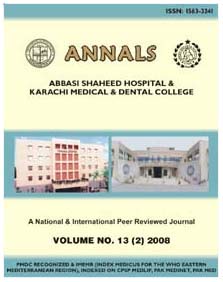
| |
| Home |
| Editorial Staff |
| Instruction to Authors |
| Journal-Issues |
| Policy |
| Copyright |
| ROTAVIRUS AS THE ETIOLOGICAL AGENT OF DIARRHEA
IN HOSPITALIZED CHILDREN
*FARAH NAZ, **SAMINA SHAMIM, ***WASEEM JAMALVI, ****BUSHRA MOIZ, *****ZIA JAMALVI ABSTRACT Background:Diarrheal diseases are a significant cause of mortality in children under five years of age and rotavirus is considered to be one of the major causes of childhood gastroenteritis. As it is a significant contributor to childhood mortality in developing countries, WHO recommends epidemiological studies regarding rotavirus especially in developing countries. As it is a vaccine preventable disease these researches can have a significant impact on the future recommendation of vaccines. Methods: Objective: To identify rotavirus in the stool analysis of children less than five years of age, presenting with acute diarrhea. To describe the age distribution and clinical features of rotavirus gastroenteritis. Design: Hospital based, cross-sectional study. Results: Analysis of 40 fecal samples was done for rotavirus by immunochromatography; rotavirus was identified in 6 (15%) samples. The majority of the children with rotavirus gastroenteritis were younger than 2.5 years. The children who tested positive for rotavirus had a better nutritional status than the children who were negative for the virus. No significant difference was seen in the duration of diarrhea and of hospitalization in the two groups. Conclusion: Diarrhea is a major public health problem in developing countries. Rotavirus as the etiological agent was detected in 15% of cases in the present study, which is in close approximation to several other studies from Pakistan. Still large-scale studies are required to determine the prevalence of rotavirus gastroenteritis that can have important implications for rotavirus vaccination. Meanwhile our strategy should focus on good sanitation and clean drinking water to save our children from this democratic disease. Keywords: diarrhea, gastroenteritis, rotavirus.
|
For Full text contact to:
|
|
* Instructor,Department of Pediatrics
Aga Khan University Hospital, Karachi.
|

Copyright © 2009 Abbbas Shaheed Hospital and Karachi Medical & Dental College.
All rights reserved.
Designed & Developed by: Creative Designers